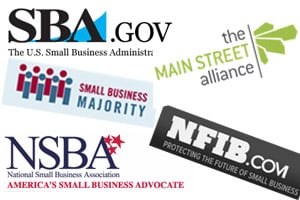 The U.S. Small Business Administration (SBA) states its mission as, “to aid, counsel, assist and protect the interests of small business concerns, to preserve free competitive enterprise and to maintain and strengthen the overall economy of our nation…The SBA helps Americans start, build and grow businesses.” Whether you’re an entrepreneur just starting your first small business, or an established small business looking to grow, or simply to continue to prosper, the SBA is a great first stop for assistance with everything from tax issues, to training, to becoming a government supplier. If you haven’t explored the SBA website, it is definitely worth your time to do it. Start in the SBA Learning Center for a huge catalog of training materials, templates, and videos. Then, check out the SBA Tools page for even more helpful small business resources.
The U.S. Small Business Administration (SBA) states its mission as, “to aid, counsel, assist and protect the interests of small business concerns, to preserve free competitive enterprise and to maintain and strengthen the overall economy of our nation…The SBA helps Americans start, build and grow businesses.” Whether you’re an entrepreneur just starting your first small business, or an established small business looking to grow, or simply to continue to prosper, the SBA is a great first stop for assistance with everything from tax issues, to training, to becoming a government supplier. If you haven’t explored the SBA website, it is definitely worth your time to do it. Start in the SBA Learning Center for a huge catalog of training materials, templates, and videos. Then, check out the SBA Tools page for even more helpful small business resources.
The SBA acts as the U.S. federal government advocate for small business, but it is still part of the government. If you’re interested in engaging with independent organizations that not only provide small business services, but actively engage with federal, state, and local governments to promote small business interests and opinions, you’ll need to look further than the SBA. The following groups, which span the political spectrum, are all dedicated to serving small business interests via research, publicity, and lobbying efforts.
Small Business Majority was created to, “bring the voices of small business to the policy table.” The organization takes a three-pronged approach to advocating for small businesses by conducting scientific research, engaging directly with policy makers to make them aware of small business views, and creating a network of small business owners who work to educate their colleagues, their communities, and their lawmakers. Check out their small business opinion research on taxes, budget and the economy; healthcare; immigration; energy; entrepreneurship; workforce issues; and government accountability. For example, a recent report focused on The Toll Extreme Weather Takes on Small Business and the Economy. You may also find the Resources on Healthcare, Clean Energy, and the Family Medical Leave Act FAQs useful.
The Main Street Alliance mission is, “to provide small businesses a voice on the most pressing public policy issues across the nation. Our advocacy promotes vibrant businesses and healthy communities, and fosters leadership development of socially responsible business leaders.” It was originally formed in 2008 to give small businesses a voice in the healthcare debate, and is now comprised of small business coalitions in 12 states that focus on a range of issues affecting small businesses and local economies.
The National Federation of Independent Businesses (NFIB) is a small business advocacy association with a mission to, “promote and protect your right to own, operate and grow your business.” It currently has about 350,000 small business members across the United States to which it provides negotiated group pricing on small business related products and services. It also engages in lobbying efforts on behalf of small business at the federal, state and local levels as well as conducting ongoing research and polling on small business issues. Their monthly Small Business Economic Trends report is a widely recognized barometer for how the U.S. small business economy is performing. The July numbers, released this month, show a 0.7 point uptick in optimism, though the study notes that overall small business optimism remains at a historic low.
The National Small Business Association (NSBA) was originally founded in 1911 to provide a voice for entrepreneurs and the small business community. That mission continues today with the group meeting every other year to decide on the small business issues they want to promote, and sponsoring meetings and events that bring small business owners together with their government representatives to make their viewpoints, and pain points, known. Additionally, the organization conducts research and opinion polls that are used to publicize small business viewpoints on politics and the economy. For example, check out the recent 2014 Politics of Small Business Survey and the NSBA 2014 Taxation Survey.
In addition to these national organizations there are a number of state and local small business organizations with which you may want to engage. For example, check out local small business development centers, local SCORE chapters to find mentors, local women’s business centers, and local small business meet-ups.
Do you belong to a local or national small business organization not listed here? Tell us about it in the comments and share your experiences, your goals, and your success stories.
See weekly Small Business Tips like this one by subscribing to our blog.


